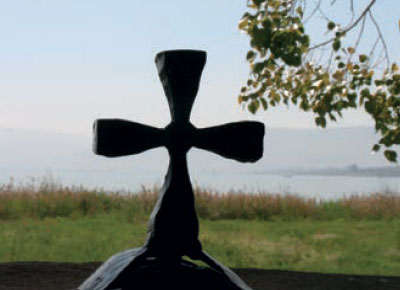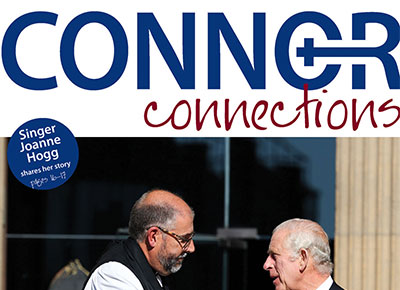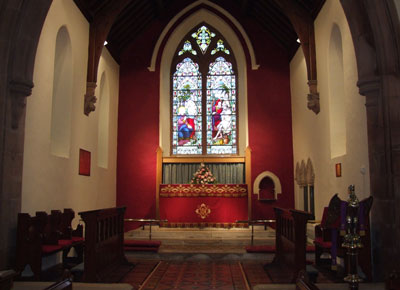Bishop Alan’s final update from WCC Assembly in Korea
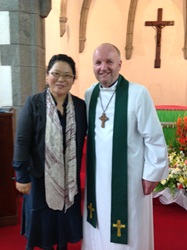 As the Bishop of Connor, the Rt Rev Alan Abernethy, prepares for the long journey home from Korea where he is attending the 10th Assembly of the World Council of Churches, he submits his final report from Busan.
As the Bishop of Connor, the Rt Rev Alan Abernethy, prepares for the long journey home from Korea where he is attending the 10th Assembly of the World Council of Churches, he submits his final report from Busan.
He will be planning one more update when he returns home, and his visit to the Republic of Korea, where he is representing the Church of Ireland, will also feature in the next Connor Connections in the New Year.
In his last update from Busan on Thursday November 8, he writes:
The final morning had as the theme “Footprints” with the reading from John 13:2b–8, 12–17. During the worship there was foot washing by some delegates to remind us all that we are called to model the servant ministry of Jesus.
The first song was an Arabic song, “Uhibbuka Rabbi Yasu” translated as “I give you my heart, O Christ”. We sang it in Arabic or at least I tried to. There was a meditative song from Singapore, “Love consecrates the humblest act”.
In English, Spanish and Korean we sang a Taize chant entitled “The Kingdom of God”. A reflective Kyrie from the Syrian liturgy, North India which interspersed the intercessions as we recognised that we have failed to love our neighbours as ourselves.
The Lord’s Prayer was a sacred moment as we committed ourselves together to work with God and each other for the unity of the church and to strive for justice and peace in our context and again we did so in our own tongue.
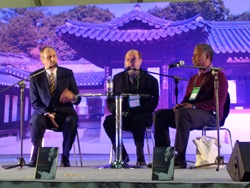 There was no bible study as the last day we are spending all the time doing business as we seek to agree to various statements and reports for publication on behalf of the WCC. These are many and detailed.
There was no bible study as the last day we are spending all the time doing business as we seek to agree to various statements and reports for publication on behalf of the WCC. These are many and detailed.
I have the first meeting of the Central Committee this evening and then to bed for a few hours sleep before I begin my journey home.
I leave my hotel at 5am Korean time and 8pm UK time. I fly home from Busan to Japan to Paris and then to Dublin.
I arrive in Dublin on Saturday evening 7:40 (UK time). Please do pray journeying mercies as I travel home.
Grace and peace from Busan,
+Alan.
Previous reports submitted by Bishop Alan (in chronological order) can be read below:
Day One:
I have arrived safe and well after a long journey. Flew from Dublin to Amsterdam, Amsterdam to Seoul and Seoul to Busan. The time difference is 9 hours, my body clock is struggling as I have lost 9 hours somewhere.
My participation at the conference began this morning with prayers at 8:30. A fascinating new simple liturgical structure, with African singing and prayers in different languages concluding with the Lord’s Prayer said in our own native tongue.
This morning’s plenary was opened by a special visit from the Prime Minister of the Republic of Korea. Then followed a reflection on the church’s role in justice led by different speakers.
Two highlights were a presentation regarding HIV/ Aids and what has happened in the numbers of people treated and the hope that no child will be born with this disease very soon. Secondly a reflection on the theology of victims modelled and incarnated by Jesus.
It is only lunch time on first day so much more to come.
Day one / two:
For lunch on Thursday I visited a ‘Pizza Hut’ and no it wasn’t a pizza but some spaghetti!
The afternoon continued with a business meeting of the Assembly. The main business was about the process of elections to various WCC committees and reports on how this would be taken forward. Over the next few days there will be nominations for these posts. It was interesting as I was able to exercise my voting rights as a delegate representing the Church of Ireland.
The afternoon also included a regional meeting of European delegates and an ecumenical conversation about theological education and ecumenical implications.
On Thursday night I managed to catch up on some of those lost nine hours jet lag.
Today (Friday) has started with morning prayer and a bible study form the book of Amos about justice.
We are at present receiving greetings from the Archbishop of Canterbury.
Day two / three:
Friday morning bible study was based on Amos 5:14–24. This involved particular focused questions discussed in small groups and the cultural mix, denominational variation and the geographical spread makes these discussions fascinating, although there isn’t enough time for any great depth.
The following are two comments; “For Amos God is a god of relationship. “God’s frustration with His people is a moment of love and hope as He is unwilling to give up on His people.” The daily bible studies are each morning at 9:15 to 10:15 and they are preceded by morning worship at 8:30.
At 11:15 the main plenary session takes place and lasts until 12:15. Friday session began with some greetings and there was one from the Archbishop of Canterbury and one from the Chairperson of the Pentecostal Global Fellowship.
The session was led by people from Asia and focused our thinking on the theme of the conference; “God of life, lead us to justice and peace,” reflecting on this from an Asian perspective. There was singing, dancing, photographs and images from Asia on the large screens and it was very moving and informative.
We then all scrambled our way to find something and somewhere to eat, I settled for a sandwich and a bottle of water. After lunch there was another business session from 2:15 to 3:45. This involved a listening to comments on a statement drafted on unity, a discussion on the nominations to the Central Committee of the WCC, there are not enough nominations yet, and there are clear guidelines on representation on different issues including gender, age, region and denominations to name a few. There was also a report of the policy committee.
It was then time to leave to prepare for an evening for confessional meetings, so I went to an evening for Anglicans hosted by the Anglican Church of Korea. This involved some informal conversations at the tables we would later eat at.
We then had the joy of sharing a Eucharist for All Saint’s Day. The Primate of the Anglican Church Of Korea, Paul Guen–Sang Kim, presided and the Archbishop of Canterbury preached. This was followed by five speeches, a fascinating short video of the history of the Anglican Church in Korea and toast to them.
A wonderful feast then followed and we were eating at 9:15. It was back to my accommodation after that for a night’s sleep and even better today was a day for relaxation and a short walk around the part of the city in which I am staying.
I am writing this late on Saturday evening after having put the finishing touches to my sermon which I had to write a script for as I am being translated. I am preaching in Busan Cathedral and the Bishop of Busan, Onesimus D. S. Dark, is celebrating Holy Communion.
We are then being entertained by the cathedral congregation and have an evening of cultural celebration in the conference centre to look forward to.
Back to business on Monday and five days of hard work before we finish.
Please pray for the conference. Please pray for me and for all of us particularly for stamina.
Monday November 4
The morning began at 8:30 with a very creative act of worship with a mix of songs, liturgy, prayers and a focus on the amazing gift of water and how it is so important as a symbol of blessing.
We were called to worship by Korean drums – quite a contrast to church bells. It is exciting to watch so many people from so many nations and tongues joining together to proclaim “Christ is Risen”. There is colourful dress, different languages, different traditions, rich mix of age and gender and wonderful sound when we all sing.
Coming from a small island it is exhilarating to be part of the rich tapestry of God’s family here on earth. We sang an African/American song in English and Korean, a Russian song in German and a haunting “Kyrie” in Indonesian as we remembered the victims of hurricanes and tsunamis.
The Bible Study was Acts 8:26–40 and continued the theme of living water. The passage was reflected on in the context of Early Church and Acts. There then was discussion about what it said into each of our contexts. It is amazing how the scriptures do have something to say to so many different people and situations. It was particularly challenging to hear the subject of living being discussed by people places where there is severe shortage of water.
Before the session began there were some greetings brought to the Assembly. There were greetings from the Lutheran World Federation, the World Evangelical Alliance and the International Jewish Community. The latter said something fascinating; “we are partners in waiting for the Messiah.”
The morning plenary had as its focus Mission. It was reflecting on this subject through the lens of a recent publication by the WCC entitled “Together Towards Life (Mission and Evangelism in Changing Landscapes). The session highlighted the common challenges and opportunities for mission, in light of the many global developments. We were urged to find ways of working together for a common witness.
This plenary was a done through presentations from speakers and interspersed with dance and drama from the “Teatro Ekyumenical”, a cultural theatre group of the National Council of Churches in the Philippines. They led the auditorium out to singing as we followed. There were some phrases that I found helpful during this plenary.
“Mission is finding out where the Spirit is and joining in.”
“We must look in the eyes of others as Jesus did.”
“Mission is rooted in the Trinitarian community that fosters sharing, justice and permanence.”
“Mission is also from the margin.”
After lunch there were ‘Mandang Workshops’ and there were 22 to choose from. I attended the entitled “Stop Climate Change Now! Save people’s environment and livelihoods”. This was a fascinating presentation based on ecumenical team visits to certain parts of the world and presented findings on the impact of climate change, environmental destruction and the exploitation of natural resources on people’s lives. This was fascinating because of the nature of this Assembly there were delegates here from some of those regions. It was obvious the people who are left to struggle most are the very vulnerable.
The ecumenical conversations that I attended to discuss effective leadership and the contextual ecumenical formation and theological education. This conversation continues to highlight one of the lessons of this Assembly and also one of the difficulties of what we are trying to do. Each and every culture is different – the context for how we are church in every culture and context has to be wrestled with by those in the context but it is enriched by having the conversation with others from different contexts.
Business Meeting: This took place at 6:15 in the evening and I have to confess my energy levels were struggling. This was the election results from the nomination committee.
Tuesday November 5
We began today with a call to worship on the gentle beating of a gong. The reading was from the Acts of the Apostles and the account of Pentecost. We sang a beautiful Kyrie from the Russian Orthodox, a song in English and Tuvaluan and a joyful feet–tapping song from Namibia. As always the Lord’s Prayer reminds us we all belong to Him.
The bible study was on Acts 2 and we reflected on the critical role of the Holy Spirit to bring unity to such a diverse collection of nationalities and languages. These people discovered together Christ’s resurrection presence and life bringing them into a new family.
At the beginning of the plenary we had greetings. We received written good wishes from the leader of the Focolare Movement. The executive director of the Lausanne Committee for World Evangelisation, Michael Oh, brought greetings and the request that there are continued conversations between his organisation and the WCC.
There were two main speakers and the first was Metropolitan Nifon from the Rumanian Orthodox Church. The church is not just an institution but a sign of God’s kingdom.
Our understanding of the Holy Trinity is foundational when we talk about unity. The real challenge is our ecclesiology as to how we can have so many churches. We must face our disunity with honesty. We accept the tension of our disunity but we work towards the restoration of the church. He asked for patience, passion and hard work.
The Rev Dr Neville Callam, General Secretary of the Baptist Alliance, Jamaica, encouraged us to give thanks for what has happened already. He also suggested three challenges:
1. We need to find convergence on the sources we find authoritative.
2. We should foster theological thinking with our young people on unity.
3. Let us not limit our thinking and actions to being textual.
He also prayed God would keep us restless on our journey.
We all were asked to write our own prayer for unity and the session ended with some beautiful singing of Taize chants. There were two comments from a young theologian from South Africa that resonated with me. God who created can recreate. Hope and despair go hand in hand.
I took this afternoon off as I needed some time to catch my breath and rest. This is a wonderful privilege and joy to be here but it is exhausting. I will be back this evening for the business session.
Wednesday November 6
The drums called us to worship again this morning. The theme was that of justice and that will be the theme of the bible study and plenary this morning. We sang a Philippine song in English and a English song in Korean.
We also sang a Spanish song, but the song that disturbed and inspired me was an American song and the refrain was as follows:
“Until all are fed; we cry out, until all on earth have bread.
Like the one who loves each and every, we serve until all are fed.”
I wish I could say I am learning new languages but at least I can hum and make a joyful noise!
The reading was 1Kings 21:1–22. I it is special every morning to say the Lord’s Prayer in our own tongue. The music and singing are led beautifully every morning giving energy and creativity to our worship.
The bible study was focused on the question of justice, 1Kings 21:1–22. In the context of different cultures it was fascinating and disturbing. The mixture of faith and land ownership, of inheritance and market forces. The clash of culture and religion. This is a human story and within the question of integrity and faith in the living God.
Discussing this with people from around the globe, especially those who live with poverty and hunger, made the scriptural probing all the more intriguing.
The plenary began with greetings and there was a letter read to the Assembly from the Secretary General of the United Nations, Ban Ki–Moon. I quote one line: “Religious leaders are well placed to bring about changes in mindsets that lead to change in our society.” There were also greetings from the National Council of Churches of Africa.
The plenary began with two songs from very young children from the Allak Kindergarden Presbyterian Church. There were two questions asked at the beginning of the session;
1. What kind of world do we live in?
2. What kind of world will our children live in?
There then followed an interview with four people from across the world discussing financial injustice and the world’s economy, human rights abuse, environmental damage and a theological reflection on justice. There were a few quotable quotes and they were as follows:
“The poor don’t need our charity but our advocacy to speak for them and to change the structures that keep them poor.”
“Women are the back bone of the church and the church would not be here without them”.
The most moving was from a 19–year–old girl from Malawi who is HIV/aids positive and she received a lengthy applause when she said: “HIV/aids is not a punishment from God but a disease”.
There followed three business sessions, the first of which was the final meeting to elect the Central Committee of the World Council of Churches. To my surprise I have been elected to this committee to represent the Church of Ireland.
This committee will meet every two years between now and the next Assembly that should take place in seven years. I am delighted to be able represent the Church of Ireland in this way and I know I will find it stimulating and challenging.
The other two were sessions to hear the reports from various committees that keep the work of the WCC focused and active. These meetings were not unlike the business meetings of a diocesan synod and no, I didn’t fall asleep!
More to follow tomorrow and I am really looking forward to coming home, there is no place like it. I leave here Saturday morning which will be very late Friday UK time. Pray for me and for all flights to be on time! However I will have two more updates before then.
Thursday November 7
The call to worship was again by drums, they are actually bongos and some percussion. The theme was ‘paths to peace.’ The liturgy began with a Chinese song and we sang it in Chinese, English and German. The reading was John 14:27–31.
We shared the peace which took some time as people didn’t stay in their seats. During the intercessions the choir led a sung response in Hebrew based on “My peace I give to you”. Yet again we say the Lord’s Prayer in our native language. The choir also led a song based on ‘The Beatitudes.’ We finished with a Korean song that prayed for the Spirit to give us peace. Worship at the beginning of the day gives a focus and is refreshing.
The bible study focused on the passage from John Chapter 14. There are people in my group from Syria, Palestine and parts of Africa who live in a war zone and are wrestling with peace. There were others who talked of murder and crime in places where there isn’t war and that is not peace. We all wrestle with finding peace in our countries, our communities, our churches and our homes. Peace is not just absence of war and conflict but something deep within the human spirit.
We concluded our last bible study by praying for one another and singing the words of a Korean hymn (in English), based on the prayer of St. Francis: “Where there is blindness we will pray for sight, Where there is darkness we will pray for light, Where there is sadness we will bear their grief, To the millions crying for relief we will be his instruments for peace.”
The plenary was focused on peace and was led by the Archbishop of Cape Town and South Africa, Thabo Makgoba. Peace is a gift and a promise of God, a call that all can answer, a journey of faith to which all are invited.
There were two main contributors. Dr Chang Yoon Jae is a professor of theology at Ewha Women’s University in Seoul, he is a member of the Presbyterian Church in Korea and a teacher, author and speaker on topics related to society, justice and peace. Ms. Leymah Gbowee is a peace activist, social worker, women’s rights advocate and a Nobel Peace Laureate of 2011. She led a nonviolent movement of Christian and Muslim women that played a pivotal role in ending Liberia’s civil war in 2003.
There were greetings from various groups and two of them were ACT, Action for Churches Together, working for humanitarian aid throughout the world and Sant’Egidio, a lay Catholic organisation based in Rome
The following are some thoughts and comments from this plenary:
“Her anger led her to write and led her to work for peace with a special concern for child soldiers”.
“We live with constant fear of war even though there is civil peace”.
“The church has become bystanders in the face of injustice and greed”.
“Get out of the car and walk.”
“We are called to live for justice and peace in radical and passionate discipleship”.
My two favourites where firstly a Liberian parable: “In order to bring in a new mat for sleeping on you have to examine the old one for its weave”. Secondly a car sticker that says: “ When Jesus said love your enemies, he probably meant don’t kill them”.
The plenary finished with the delegates holding hands, praying and then leaving the auditorium waving ribbons as the musicians and singers led us in song.
There was a call for silence as listened to the struggle for peace and the pain of the world. The lights were switched off, a candle lit on stage and after a period of silence we all sang; “This little light of mine, I’m going to let it shine”.
There were contributions as well from M. Stanley Noffsinger who is the general secretary of the Church of the Brethern; Ms Agata Abrahamian who is the leader of the Armenian Apostolic Church’s youth community and a member of the Armenian Orthodox Church and comes from Iran and lives in Iran; and Mr Fabian Corrales, a scholar in disabilities in Costa Rica and a Baptist.
This afternoon there is a business session and confessional meetings, when I join with the Anglicans.
Tomorrow is the last day and I am relieved, this has been a wonderful and enriching experience but my stamina is being challenged!
© Copyright The Church of Ireland Diocese of Connor 2024 | Web Design by LD2.digital

